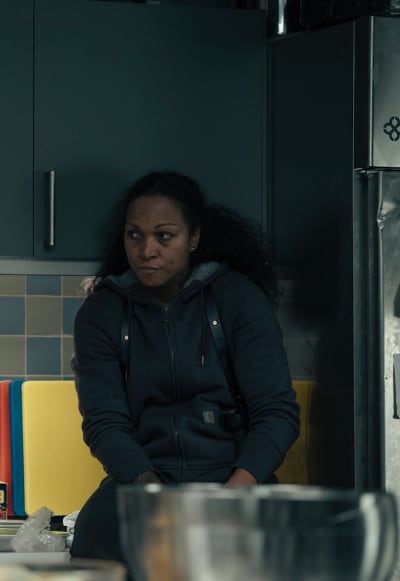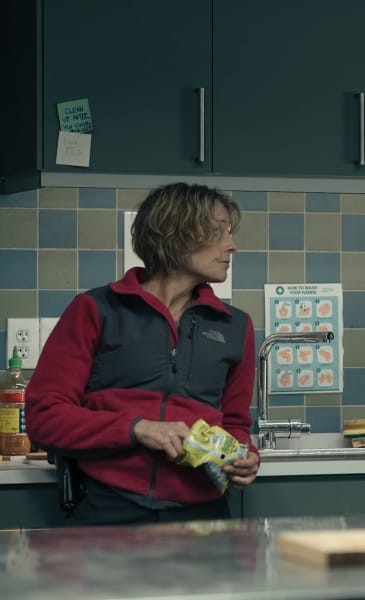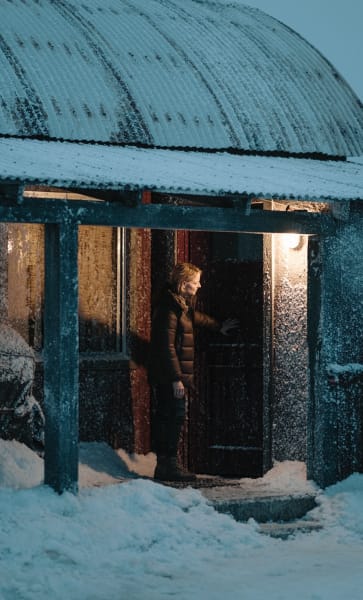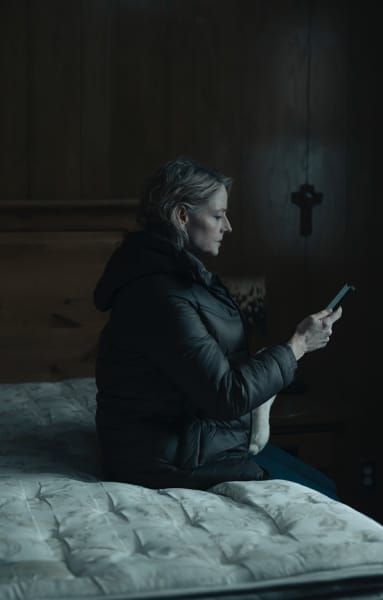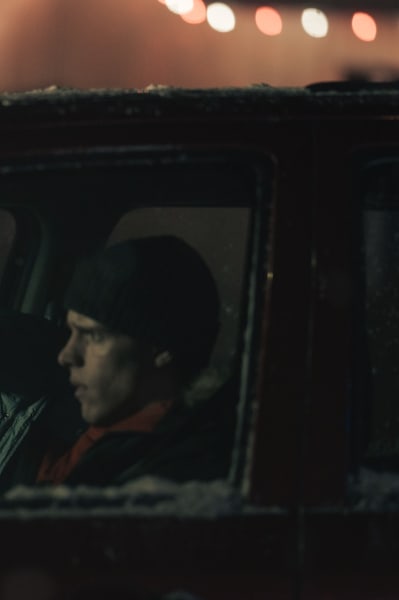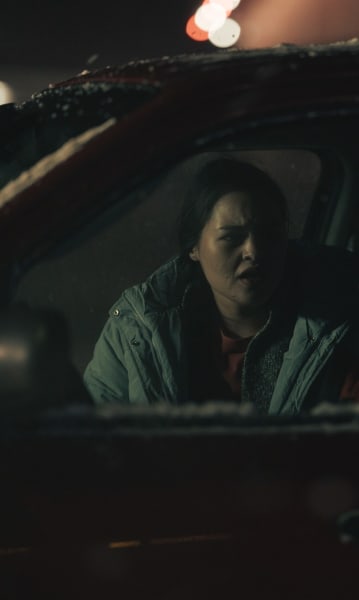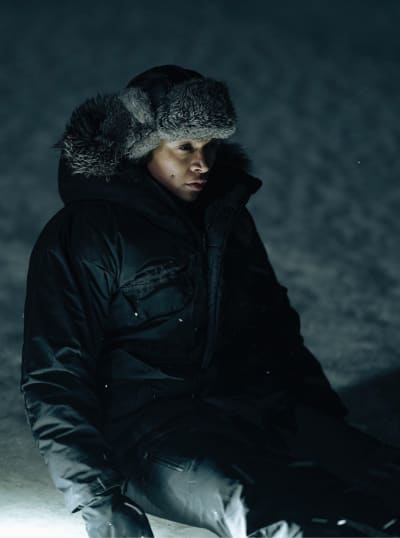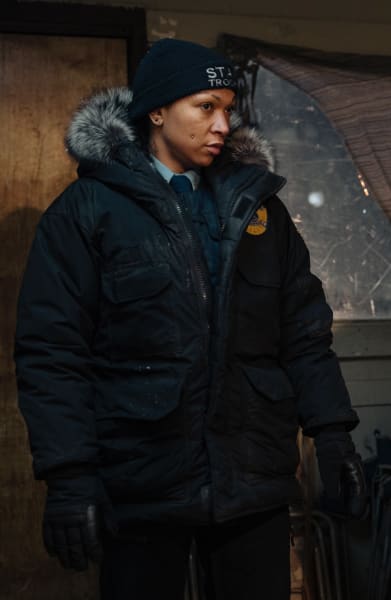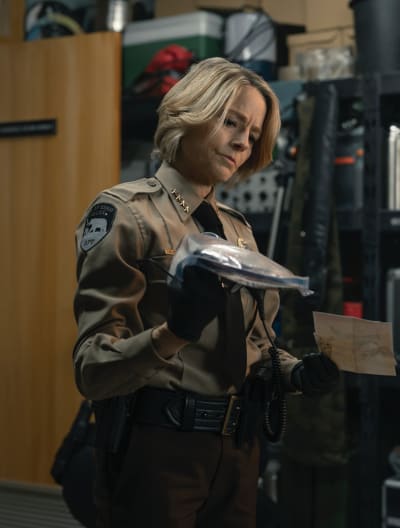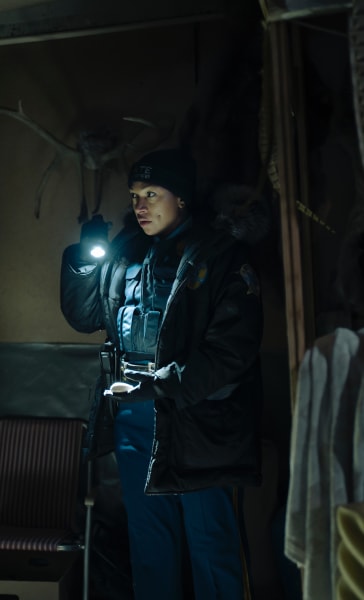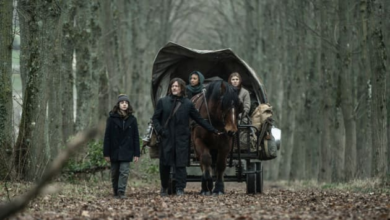True Detective Season 4 Episode 3 Review: Night Country Part 6
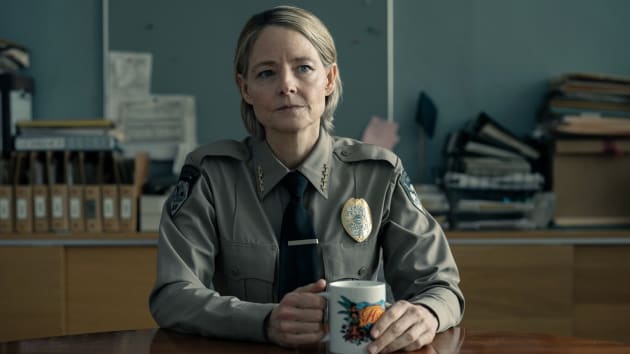
It may not be the most highfalutin adjective, but if you wanted to describe the tone of True Detective: Night Country in a single word, you could do a lot worse than “spooky.”
Sure, the show’s previous seasons trafficked in creepiness as well, but in taking over for creator Nic Pizzolatto, new showrunner Issa Lopez has taken the “graveyard at midnight” vibes to a new level.
With its constant dark, howling winds, frozen corpses, and actual freakin’ ghosts, Night Country has often felt more like a horror flick than a police procedural.
So it’s fitting that True Detective Season 4 Episode 6 should kick off the finale proceedings by plunging our protagonists into an underground cave where a woman was murdered years earlier.
Navarro literally takes the lead in this stage of the investigation, following a whispering voice that once again has Danvers (and the audience) wondering if she’s supernaturally gifted or suffering the same auditory hallucinations that plagued her late sister.
If you’re the type of viewer who’s been rolling their eyes at this season’s more trope-y moments, then you might have let out an audible sigh when the ground gave beneath Navarro’s feet, and she fell to a lower level of the cave in a scene straight out of The Goonies.
Moments later, of course, Danvers suffers a similar fate.
For all its shortcomings as a piece of detective fiction, this season has been pretty masterful in its command of tone, so the weird veer into horror-comedy territory is a little jarring.
Suspect Raymond Clark appears on cue, and the cops chase him down a tunnel that leads to just a surprisingly complex laboratory — at least by underground ice cave standards.
True Detective Season 4 has delivered some genuinely compelling moments thus far, and we wanted so badly to take this finale seriously, but showrunner Issa Lopez did not make it easy.
Predictably, the crooked spiral symbol is found on the ceiling of Clark’s weird ice lab, leading us to wonder — not for the first time — if it was a mistake for Loez to try and tie this story into True Detective Season 1 when she already had so much on her agenda.
There are clues everywhere, and in the kind of twist (and shout!) that doesn’t really surprise anyone, the lab contains an entrance to the Tsalal station, where, apparently, “Twist and Shout” will play on repeat for all eternity.
The show once again blurs the line between horror and police procedural with scenes of Clark lurching through the chilly halls, a la Jack Nicholson in The Shining.
Navarro and Danvers both find themselves in dangerous situations that are resolved almost comically quickly.
From there, Danvers declares that due to the blizzard, all lines of communication are cut off, and they’re “stuck out here” — because of course they are.
Now, True Detective can be forgiven for indulging the occasional genre cliche, as from the pulpy title to the time-worn “rival cops setting aside their differences to solve the case” trope, that sort of thing is baked into the show’s structure.
We expect it, and we forgive it because, at its best, the series successfully turns those cliches on their ear and leads us to look at them in a different way.
But Lopez might be a little too comfortable walking down well-trodden paths. When we can’t tell the difference between attempted subversion and just plain lazy writing, there’s a problem.
Another common complaint about this season has been the lack of interrogation scenes that made previous installments of True Detective so memorable.
We get one — sort of — when Clark awakens. And we don’t think anyone expected Navarro to open the game by asking the guy if he’d actually loved Annie.
There’s no clever verbal sparring to follow, as the detectives merely duct tape some earbuds to Clark’s head and force him to listen to audio of Annie’s screams on an endless loop.
Since that would probably be a deeply unpleasant experience for anyone, it doesn’t seem like the experiment would really prove anything.
With his psychological torture session at an end, Clark confesses that the Tsalal project was both more successful and more evil than anyone realized.
The team had succeeded in unlocking the secret to longer life via frozen microorganisms, but they were also encouraging the Silver Sky mining operation to crank our more deadly pollutants in order to aid their research.
In varying degrees, every True Detective investigation transcends the details and logistics of a specific murder case to explore some of the big questions about life, death, class, corruption, etc.
But earlier seasons took a more spiritual/philosophical angle, while in Lopez’s story, a billion-dollar corporation is very literally killing off marginalized people by the dozen in order to crack the code to eternal life.
Clark emerged as the prime suspect way back in True Detective Season 4 Episode 2, and since that’s much too early for the case to be cracked, we figured the answer couldn’t be as simple as it seemed.
Sure enough, Clark didn’t act alone — far from it.
In fact, it was the entire rest of the Tsalal team, which is a twist you might have loved if you’ve been mostly interested in this show for its subtextual commentary about race and corporate greed.
But if you’re more interested in a compelling murder mystery, then the explanation that a group of buttoned-down scientists simultaneously succumbed to mass psychosis because someone trashed the research probably didn’t really do it for you.
Most viewers probably fell into the latter camp.
Clark finished the job of murdering Annie, which seems to be Lopez’s way of saying that none of the men involved in despoiling native land are without blood on their hands.
Annie’s severed tongue is news to Clark, who reveals that that must have been the work of the cop who moved the body — an act that Hank Prior confessed to just before his son blew his brains out.
The blowing out of brains seems to be this show’s way of solving problems, as Danvers reveals that Navarro shot Wheeler in the head years earlier, which doesn’t quite jibe with what we’ve seen from the state trooper up to this point.
Sure, Navarro flew into a violent rage after her sister’s death, but for the most part, she’s shown herself to be a cop who’s committed to doing the job and doing it right.
Revealing her to be some sort of cold-blooded Dirty Harry type is the sort of twist that makes us rethink everything that came before it — and not in a good way.
Speaking of twists, it turns out that while the cops swept the Tsalal scene, Clark was literally right beneath their feet, having fled to his underground cave to escape the murderous force that he still believes was the ghost of Annie K.
The bloodied scientist then channels his inner McConaughey by declaring that “time is a flat circle.” Yes, he really used that line from True Detective Season 1. Another “love it or hate it” moment that probably elicited mostly the latter response.
Lopez said from the beginning that she intended to tie the events of this season into the saga of Hart and Cohle from back in 2014, and she’s done so, but only in vague, oblique ways that are likely to leave most TD diehards with the feeling that that case should’ve remained closed.
Anyway, even though she seemed content to let Navarro off Clark earlier in the interrogation, Danvers is furious when she learns that the power has gone out and Clark has met the same frigid fate as his Tsalal colleagues.
During the quest to restore power, a spooky hubcap (a flat circle! Get it?!) rolls down the hall, and Navarro once again sees a ghost — this time that of the recently departed Mr. Clark.
As Peter Prior recruits Rose Aguineau to help him dispose of a couple of stiffs, Navarro declares her belief that Julia’s otherworldly visions might have been accurate, leading us back to Rose’s comments about the difference between mental illness and spirituality.
It’s then that we get out first clear explanation of what happened to Danvers’ late son, Holden, who was killed by a drunk driver.
Was his fate cynically teased for too long? Is it odd that the franchise has taken such an explicitly supernatural turn? Yes — but there’s no denying the power of the scene or of Jodie Foster’s performance in it.
There’s more underexplored but emotionally impactful material as Navarro suffers another flashback to her combat days and hears a ghostly voice — her mother, perhaps? — whispering her Iñupiaq name.
While fans will likely continue to debate Night Country’s effectiveness as a police procedural, there’s no denying its impact as pure horror, and Lopez really commits to the bit with a scene in which Danvers crashes through the ice after seeing Holden trapped under the surface.
For a moment, we think that Liz is a goner, but Navarro rescues her and proceeds to reveal that her Sixth Sense powers are legit, and she engages in regular conversations with Holden.
The scene dovetails nicely with one in which Peter disposes of his dad’s corpse in a way that calls to mind the manner in which Hank once saved his son’s life.
But as we receive a second dose of the slow, creepy cover of the Beatles’ “Twist and Shout,” Lopez once again tests her audience’s tolerance for schmaltz.
From there, we circle back (there’s that circle again!) to Danvers’ catchphrase about asking the right questions.
We also revisit the events of True Detective Season 4 Episode 1, in particular the scene where Navarro arrests a man who’s been assaulted by his wife, Blair, at her job at a fish cannery.
Revealing that she hoped to avoid “the same story story with the same ending,” (thus escaping the flat circle!) Blair’s friend and coworker, Bee, reveals that the Ińupiaq women of Ennis decided to avenge Annie K.’s death in their own way.
Again, your reaction to what followed will depend very much on what you wanted and expected of this season.
If you hoped to see marginalized people lashing out at their oppressors, then this ending might have been right up your alley.
If you prefer that your murder mysteries wrap up in a more conventional fashion, then you were likely left wanting.
The women corralled the men onto the ice, where they apparently received an assist from the ghost of Annie K. in turning these guys into a Corpsicle.
Now, Bee delivers some badass dialogue in recounting this tale, but some viewers might rightly feel that “just about everybody in the town, and maybe also a few ghosts,” isn’t a very satisfying answer to the question of whodunnit.
Not surprisingly, the detectives decide to chalk the murders up to an avalanche rather than arrest Bee and company.
The question of Annie K.’s tongue goes unanswered (ghosts, mayhaps?!), Danvers covers the whole thing up neatly (maybe a little too neatly), and presumably, the mining folks continue to get away with murder.
From an emotional standpoint, it’s a satisfying ending.
Danvers poignantly sips from a Hawaii mug as she discusses colonization; she and Navarro escape to a lakehouse together …
There’s certainly some catharsis there, but both of the crimes at the center of this investigation were committed by — large groups of angry people. And one of those groups had a ghostly accomplice?
As a work of mystery fiction, True Detective: Night Country falls well short of the mark set by some of its predecessors.
(The less said about True Detective Season 2, the better, but the other two installments demonstrated masterful control of the elements of the genre.)
The finale revealed that the reason the investigation often took a backseat to the interpersonal drama is that it was the part of the story that Lopez was least interested in telling — a choice that might’ve been more palatable if this weren’t a series with “Detective” in the title.
At no point did we experience the anxious urgency of a murder investigation, nor did the show delve as deeply into the big questions of the human condition as it promised to in its earliest episodes.
It established tone well, yes, but even that was a mostly superficial achievement, as were the surface-level connections to the show’s first season.
True Detective: Night Country brought a lot of interesting things to the table, but in the end, they didn’t fit together in any sort of cohesive way.
The show deserves to be lauded for its performances and the memorable visuals it mined from the frigid darkness, but its conclusion was as frustrating as an abandoned cold case.
What did you think of the finale, True Detective fanatics? Hit the comments section below to share your thoughts!
Tyler Johnson is an Associate Editor for TV Fanatic and the other Mediavine O&O sites. In his spare time, he enjoys reading, cooking, and, of course, watching TV. You can Follow him on X and email him here at TV Fanatic.


